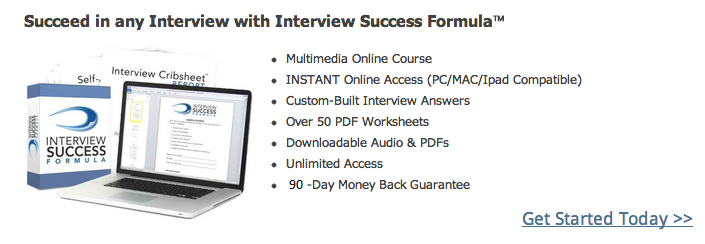 How you prep for an interview will decide how this ends...
How you prep for an interview will decide how this ends...
Scene:
A man and woman dressed in business attire sit across an office desk. They chat casually with each other.
[Conversation is interrupted by a knock on door]
“Your next interview for the manager position is here to see you…”
You enter. You feel your heart beating in your throat. You know you prepped for this, but still... The audience is watching you intently.
Yes, your job interview is a very high stakes performance. It can feel like you are on a stage that's only missing the bright lights. And, if you are convincing in the role, you will earn more than accolades in the local Arts section.
Be ready for it. Some acting-style prep work can help. Here are techniques from ‘Method acting’ that you can apply before your new job interview.
Manage stage fright
Henry Fonda was said to have gotten sick before every stage performance, even when he was 75 years old. Yet that didn’t hurt his career. Actors will tell you a little stage fright can actually improve performance – that surge of adrenaline keeps you focused energized.
When you do feel the interview nerves start to creep up on you, focus on the role that you need to present and do your best to ignore everything else. Recognize that a little nervous energy will actually keep you sharp.
Be emotionally convincing
Actors know that their emotions must match their words. Otherwise the audience is lost. If you sound like you are mechanically saying rehearsed lines or are emotionally over the top, your audience will dismiss you as phony.
As you prep for an interview, think about how you can use emotion to show passion and enthusiasm for the job. If you can match your emotions with your words, you can win both the heart and mind of your interviewer audience.
Believe you are that person
In theater, actors have to convincingly portray a character. To make this character feel real, the actor needs to believe that he or she is that person.
For a job interview, you have to do the same thing. Except, you only have to portray yourself. Still, many times, people are totally unconvincing in this role.
This happens for a few reasons:
These job seekers do not believe in themselves. They do not recognize all of the accomplishments that they had in the past, and they do not imagine how they can create value in this new job. They do not do the interview prep work to remind themselves how of much they have to offer.
To be convincing in the role of yourself, you have to believe that you are the person who achieved all those accomplishments on your resume. You also have to use a little imagination to see the future:
Dive deep into preparing for your next interview. Envision your future self in this new job and the type of work you would be doing. Think about the value you would create. Then present this vision during the interview.
Understand the story
An actor must not only understand the words in the script. He must uncover the “soul of the story”. That soul is the main message communicated through the script. The actor must understand both the story as a whole and from the perspective of his role in it.
Your job interview prep should work the same way. Though you don’t have the convenience of a script, you must understand the organization you are looking to join and its core challenges, goals and message. Then your preparation must dig deeper so that you understand the organization from the perspective of the job you would be hired into.
Become the role but stay aware
During a successful performance, an actor embodies their prepared role yet still maintains a level of external awareness. This ‘stage sense’ is what enables the performer to adapt to subtle changes in the other actors and feel comfortable with any surprises.
During an interview, you will want to communicate certain key points and also be aware of how the interviewer is reacting to your responses. While you are in the role of answering questions, you may forget these greater objectives. That's okay. Remember every once in a while to take a moment to check in on how the interview is going overall.
Practice and focus
Before a live performance, actors go through table readings, scene rehearsals, and dress rehearsals. Not to mention, time spent on their own practicing their lines and envisioning themselves in this role. This preparation allows them to not just speak words onstage, but to make those words sound fresh and persuasive, to build relationships with the other characters, and even to adapt when things go wrong.
Only a well prepared candidate can go beyond answering the interviewer’s questions. That person feels 'stage sense.’ She can cultivate a relationship with the interviewer and can adapt when something comes up unexpectedly.
As you prep for your job interviews, use these lessons to get closer to becoming the master performer.


